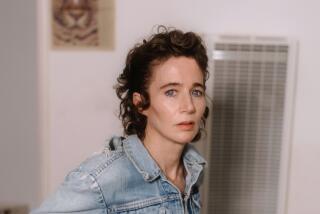Mariel Hemingway urges change to help others find a personal best
- Share via
Mariel Hemingway, makeup-free and in sweats, is gorgeous. That bone structure, her cheetah-like build and flowing hair have been familiar for decades. What’s disarming is her forthright approach to a rough family history and her determination to live the happy and healthy life that eluded so many of her relatives.
She knows a lot, she says, about what it takes to live a happy life — no matter your cheekbones or pedigree. Perhaps it’s because she’s seen enough unhappiness to last many lifetimes: for starters, the suicides of her supermodel sister and her legendary grandfather, as well as five other relatives. And there’s the depression she endured for many years.
VIDEO: Mariel Hemingway and Bobby Williams join The Times for a conversation.
With a new documentary film, “Running From Crazy,” and a book, “The WillingWay,” written with her business and romantic partner, Bobby Williams, she hopes to inspire other people to find their best lives.
“We invite you to look at how you are living your life,” she says, and from there, make changes — be it a different breakfast or a different spouse.
Williams and Hemingway, perhaps best known for her Oscar-nominated performance in “Manhattan,” try to practice what they preach at WillingWay Ranch, not far from Pepperdine University in Malibu. It’s their home and their laboratory.
There are animals: 11 Rhode Island red chickens (the couple trades the eggs at the farmers market); two dogs, the obvious masters of their universe; and several dozen hummingbirds that flit among three porch feeders and a chubby bush below.
The stone-fronted house is modest, just 1,100 square feet, and full of books, Buddha statues, iron teapots and a big white L-shaped couch. Outside, a luxuriously big wraparound porch has two sitting areas, a barbecue and a fireplace.
There are rock-climbing holds on the ceiling, so Williams can Spider-Man his way around. Those are just the tip of the athletic iceberg at the WillingWay Ranch, a veritable playground of pingpong, footballs, bikes, kettle bells, a rope ladder, climbing wall, weights, a basketball hoop, two slack lines, swimming pool, trampoline and a Wiffle ball diamond where former owners kept horses.
Then there’s the two-story red-and-white tepee that was Hemingway’s 51st birthday gift last fall. Inside, rugs and pillows ring a rock fire pit — one of life’s simple but powerful pleasures, Hemingway says.
When the fire is strong, “guys get their egos on, one-upping each other in their stories,” Williams says. “As the fire dies down, everyone gets quiet. Heads are going on laps. No one is making fun of each other.”
On a walk around the yard, the partners are chatty and warm. Williams starts climbing the rope ladder, his strength from years as a stuntman obvious. Hemingway follows, her big, strong hands and muscled arms enabling a nimble climb.
Everything at the ranch supports their view that simple things make them healthier and happier, that happiness is basic, even though “everything in our world says it has to be complicated,” Hemingway says.
Anyone might conclude, “Of course they’re happy. They’re beautiful, affluent, smart.” They readily acknowledge their blessings, especially the chance to turn what they love into their work promoting physical and mental health.
That wasn’t always the case.
Hemingway, the youngest of three girls born to Jack Hemingway, the son of writer Ernest Hemingway and his first wife, Hadley Richardson, turned to nature to escape a family where alcohol, fights and mental illness all played outsized roles, she says.
“Nature was the only solace I had,” says Hemingway, who has become an advocate of suicide prevention and an honest appraiser of the turbulence around her.
“Running From Crazy,” made by Oscar winner Barbara Kopple, premiered at the Sundance Film Festival. Using more archival family footage, it’s a haunting look at suicide and mental illness and the power of bringing them into the open.
Hemingway spent a lifetime looking “shiny and happy for everyone,” she says. And that wasn’t easy: Her parents’ nightly “wine time” often devolved into fights and left her cleaning up broken glass, she says. One older sister lives with schizophrenia, and sister Margaux died of an overdose.
Hemingway also stayed for 24 years in a marriage that she now says should have dissolved sooner: “It was so much better than the marriage I grew up with. I thought, ‘How can I leave? No one was beating me up. There was no blood on the wall.’”
She looked everywhere for a solution to her depression — gurus in India, therapy, diets, “until the ripe old age of 47, when I realized the answer is in me.”
Her evolution has been a gift to her twentysomething daughters, one a model, one an artist. “It gives them permission to share what they’re going through,” she says.
Williams, on the other hand, says he always questioned everything, living a life his father calls “alternative.”
But to Williams, it’s everyone else who’s alternative, eating “synthetic, processed and irradiated food” and scrimping through decades of 80-hour workweeks in order to fund medical interventions in later years. At 50, Williams says, he can run a mile in under five minutes and loves risky adventures, such as rock climbing sans ropes.
Together, they are grounded seekers, interested in athletic exploits, herbal tinctures and other healthcare ideas outside the mainstream.
If other people see their choices as a little odd, that’s OK, Hemingway says. “We want to inspire people to find the adventure that works for them.”
Want to hear more? Join us at 9 a.m. Monday for a conversation with Mariel Hemingway and Bobby Williams. You can watch, listen and ask questions here.
More to Read
Sign up for The Wild
We’ll help you find the best places to hike, bike and run, as well as the perfect silent spots for meditation and yoga.
You may occasionally receive promotional content from the Los Angeles Times.







